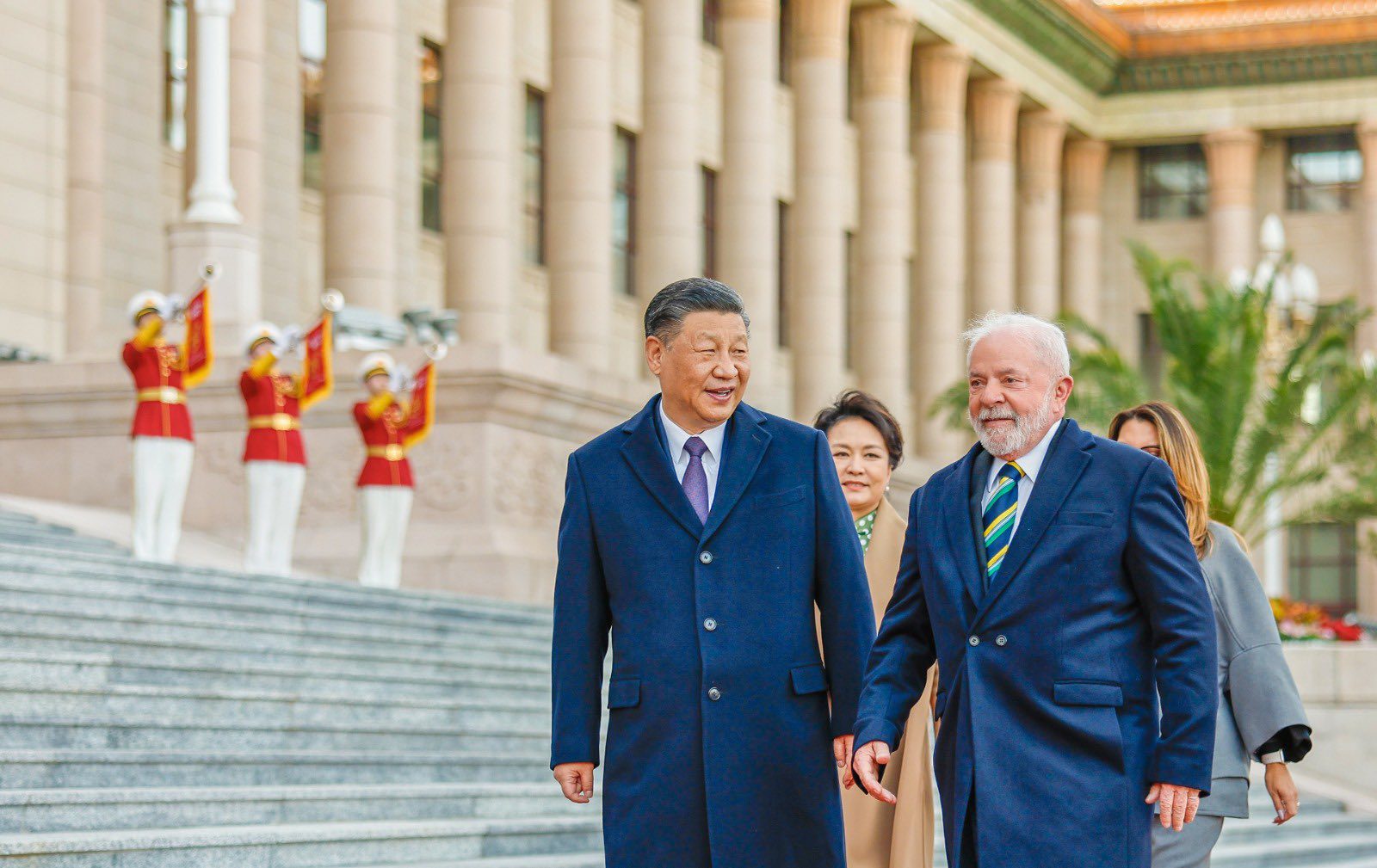
President Lula being welcomed by President Xi in Beijing, April 14th, 2023. Image taken from President Lula’s Twitter account.
Brazil’s social democrat President Luiz Inácio Lula da Silva called for the U.S. and the EU to stop weapons shipments to Ukraine, seen by him as the primary obstacle to reaching a ceasefire agreement anytime soon. The remarks are seen as another step in the forming of a coalition of powerful regional powers trying to push Russia and Ukraine to the negotiation table.
Over the last weekend, President Lula traveled to Beijing where he was offered a much warmer welcome than President Macron and European Commission President Ursula von der Leyen a week before. The primary reason for this visit was to boost Chinese industrial investment in Brazil, as long-term ‘reindustrialization’ is a key promise of Lula’s Workers’ Party. However, another important theme of the meeting with President Xi Jinping was the war in Ukraine—and how to end it together.
“We need, first and foremost, to convince the countries that are sending weapons, and incentivizing the war, to stop,” President Lula said after meeting his Chinese counterpart. “China plays a very important role …, possibly the most important role,” he said.
But another important country is the United States. [Washington] needs to stop encouraging war and start talking about peace, the European Union needs to start talking about peace so that we can convince Putin and Zelensky that peace is in the interest of everyone and that war is only in the interest of the two of them.
After returning to the presidential seat last October, Lula was celebrated across the West for defeating the conservative Jair Bolsonaro, seen by many as a populist and even far-right politician, a disruptive force in international diplomacy. However, while Bolsonaro was fiercely anti-Chinese and perhaps the most committed ally of the U.S. in recent Brazilian history, Lula was expected to fall closer to China and Russia from the start.
It couldn’t have happened otherwise, since President Lula was among the original founding fathers of BRICS (the economic forum of the rising regional powers, standing for Brazil, Russia, India, China, and South Africa), and no war could have ever shaken his commitment to the bloc.
Mais cedo, estive na Cerimônia de Deposição Floral no Monumento aos Heróis do Povo (Praça da Paz Celestial) e me reuni com o primeiro-ministro Li Qiang, no Grande Palácio do Povo. Vamos trabalhar pela ampliação do comércio e equilibrar a geopolítica mundial.
— Lula (@LulaOficial) April 14, 2023
📸: @ricardostuckert pic.twitter.com/SIaJ9MyEhG
In fact, BRICS now appears to be transforming into a global ‘coalition of peace’ as its members (except Russia) increasingly push for ceasefire and peace negotiations in Ukraine, primarily driven by concerns about the war’s effect on the global economy—while accusing the United States of recklessly prolonging the war for its own benefits. Apart from China and Brazil, India has also repeatedly called for peace negotiations, while South African President Cyril Ramaphosa is being considered as one of the chief mediators in the case of such an event.
For China (and to a lesser extent, India), brokering a peace deal would first and foremost mean a great deal of international and diplomatic prestige. For the same reasons, France’s Emmanuel Macron has been increasingly diverging from the mainstream hawkish European stance too, promoting a more independent foreign policy, gradually detached from the U.S. If Europe were to establish its strategic autonomy, that would inevitably put France in a leading position. But, for that to happen, Europe would need to adopt a somewhat more sensible take on both the Taiwanese and—perhaps—the Ukrainian issue.
President Lula’s firm stance on peace was enough to anger many in Europe. The president is expected to visit Portugal next week, where he’s invited to give a parliamentary speech marking the anniversary of the country’s Carnation Revolution, which birthed Portuguese democracy in 1974. However, the opposition parties in Lisbon have called for a formal distancing from Lula after his remarks in Beijing, saying that the president “softens or omits the responsibility of the Putin regime.”
